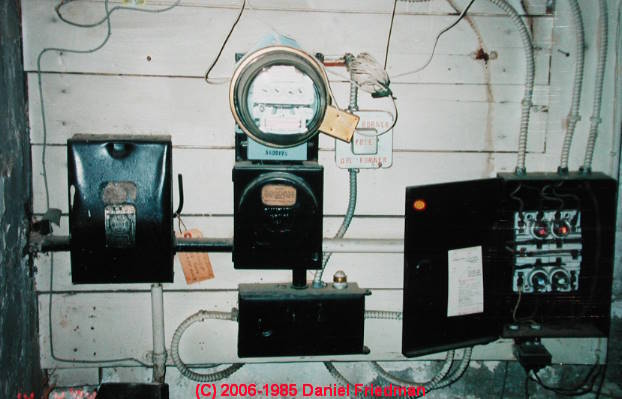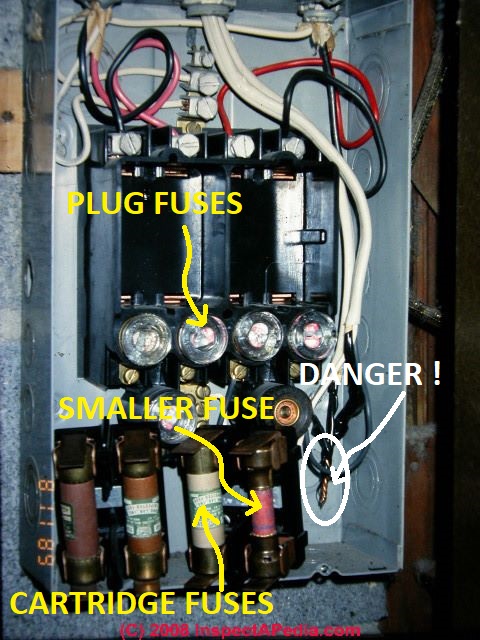 Find the Electrical Service Ampacity &
Find the Electrical Service Ampacity &
Service Voltage at a Building
- home page
Index to articles giving complete details,
Several methods can get service Volts & Amps
- POST a QUESTION or COMMENT about how to determine the electrical capacity provided at a building: electrical system ampacity and voltage levels
How to determine builng electrical service amps (ampacity) and volts (voltage):
This article series explains how to estimate the electrical service size, (or "electrical power" or "service amps") at a building by visual examination of the service entry cables, electric meter and meter base, electrical service panel, main switch, and other details. Visual inspection and use of digital multimeters(DMMs), Volt-ohm meters (VOMs), neon testers, and electrical inspection safety are discussed.
Photographs and sketches illustrate electrical panels, meter bases, and electric meters. One of the most frequently asked questions at ASHI Education Seminars and Conferences is "How do I determine the service amperage?"
InspectAPedia tolerates no conflicts of interest. We have no relationship with advertisers, products, or services discussed at this website.
- Daniel Friedman, Publisher/Editor/Author - See WHO ARE WE?
Residential Electrical Service Wire Sizes, Amps, Capacity
 It's not as difficult as one may think to get a reasonable handle on the electrical service capacity (measured in amps) at a building without sophisticated analysis.
It's not as difficult as one may think to get a reasonable handle on the electrical service capacity (measured in amps) at a building without sophisticated analysis.
But there are some pitfalls, and the process itself is inherently dangerous.
We have divided the topic of how to make an accurate determination of the electrical system ampacity available at a building into the following articles:
- AMPS VOLTS DETERMINATION - how to determine electrical service size - home - you are on this page.
- DEFINE AMPS VOLTS WATTS - basic electrical terms are defined: Amps, Volts, Watts
- VISUALLY DETERMINE AMPS & VOLTS - Introduction to voltage and ampacity of an electrical service by looking
- VOLTAGE at the SEC - how the service entry cable size limits the ampacity available at a building
- VOLTS MEASUREMENT METHODS - how to actually measure electrical voltage in a building or at electrical equipment or devices
- VOLTS / AMPS MEASUREMENT EQUIP - how to use Volt-Ohm meters VOM's, Digital multi meters DMM's or multimeters
- AMPS MEASUREMENT METHODS - how to actually measure amperage or current draw at a building, at an individual electrical circuit, or at an electrical appliance, device, motor, etc.
Note that the measurement of current draw or amps or amount of electricity being consumed is an actual instantaneous measurement of actual electrial power use at the moment, not a measurement of the design capacity or capability of the electrical service at a building or in an electrical circuit. - LIMITING FACTOR sets AMPS - explanation of limiting factors on the electrical amps available at a property
- SE CABLE & BRANCH CIRCUIT WIRE SIZES vs AMPS - table of electrical service entry cable sizes and ampacity ratings
- UNDERGROUND SERVICE LATERALS - table of underground electrical service entry cable sizes and ampacity ratings
- ALUMINUM SECs & WIRING - special concerns with aluminum service entry cables
- MAIN ELECTRICAL DISCONNECT - how to inspect the main electrical disconnect switch
- MAIN DISCONNECT AMPACITY - how the main electrical disconnect switch limits service ampacity
- PANEL AMPACITY - how to recognize age, type and volts/amps capacity of older electrical service panels or load centers
- ELECTRIC METERS & METER BASES - recognize age, type and volts/amps capacity of older electrical meters
- AMPACITY - the LIMITING FACTOR - list of five key items to inspect when determining the electrical service size
The articles from which much of this online material also appeared in abbreviated in a more abbreviated form were found in
- ASHI Technical Journal, Vol. 2. No. 1, January 1992, "Determining Service Ampacity," Dan Friedman and Alan Carson, and the
- ASHI Technical Journal, Vol. 3. No. 1, Spring, 1993, "Determining Service Ampacity - Another Consideration," Robert L. Klewitz, P.E., with subsequent updates and additions to the original text ongoing to 2/19/2006. Reprints of the originals and reprints of the Journal are available from ASHI, the American Society of Home Inspectors www.ashi.com.
Readers who are not sure of the definitions of Amps and Volts should
see DEFINITIONS of ELECTRICAL TERMS.
Watch out: inspecting and/or touching electrical components is inherently dangerous and there is risk of shock or death by electrocution.
Electrical inspections are inherently dangerous to the inspector and potentially dangerous to inspection clients and building occupants.
People conducting these procedures must first be familiar with safe electrical practices before attempting any inspection of electrical equipment. Such familiarity is essential to protect all parties concerned. Inspectors: proceed at your own risk.
See SAFETY for ELECTRICAL INSPECTORS at Residential Electric Panels.
...
Continue reading at AMPACITY - the LIMITING FACTOR or select a topic from the closely-related articles below, or see the complete ARTICLE INDEX.
Or see these
Articles on Determination of Ampacity & Voltage at Building Electrical Services
- AMPS VOLTS DETERMINATION - home
- AMPS, LIMITING FACTORS
- AMPS & SEC SIZES
- AMPS & VOLTS, DETERMINE VISUALLY
- AMPS MEASUREMENT AUTOMOTIVE DC
- AMPS MEASUREMENT METHODS
- AMPACITY, MAIN DISCONNECT
- DEFINITIONS AMPS VOLTS WATTS
- ELECTRIC METERS & METER BASES
- ELECTRIC MOTOR HORSEPOWER & CIRCUIT WIRE SIZE
- ELECTRICAL PANEL AMPACITY
- VOLTAGE at the SEC
- UNDERGROUND SERVICE LATERALS
- AMPS MEASUREMENT AUTOMOTIVE DC
- AMPS MEASUREMENT METHODS
- ELECTRICAL INSPECTOR SAFETY PROCEDURES important basic safety procedures, clothing, and equipment for home inspectors and electrical inspectors.
- VOLTS / AMPS MEASUREMENT EQUIP
Suggested citation for this web page
AMPS VOLTS DETERMINATION at InspectApedia.com - online encyclopedia of building & environmental inspection, testing, diagnosis, repair, & problem prevention advice.
Or see this
INDEX to RELATED ARTICLES: ARTICLE INDEX to ELECTRICAL INSPECTION & TESTING
Or use the SEARCH BOX found below to Ask a Question or Search InspectApedia
Ask a Question or Search InspectApedia
Try the search box just below, or if you prefer, post a question or comment in the Comments box below and we will respond promptly.
Search the InspectApedia website
Note: appearance of your Comment below may be delayed: if your comment contains an image, photograph, web link, or text that looks to the software as if it might be a web link, your posting will appear after it has been approved by a moderator. Apologies for the delay.
Only one image can be added per comment but you can post as many comments, and therefore images, as you like.
You will not receive a notification when a response to your question has been posted.
Please bookmark this page to make it easy for you to check back for our response.
IF above you see "Comment Form is loading comments..." then COMMENT BOX - countable.ca / bawkbox.com IS NOT WORKING.
In any case you are welcome to send an email directly to us at InspectApedia.com at editor@inspectApedia.com
We'll reply to you directly. Please help us help you by noting, in your email, the URL of the InspectApedia page where you wanted to comment.
Citations & References
In addition to any citations in the article above, a full list is available on request.
- The Original Authors: Alan Carson is an ASHI Member, national home inspection educator, author and building failures researcher in Toronto, Ontario. Daniel Friedman, an original author of this article and the editor and producer of InspectAPedia where this article now appears is an ASHI Member, first ASHI Technical Committee chairman, editor and publisher of the ASHI Technical Journal, licensed home inspector, educator, and building failures researcher in Poughkeepsie, NY. Robert Klewitz is a licensed professional engineer, a professional home inspector, an ASHI Member, and has served on the ASHI Technical Committee as well as in other ASHI activities. His practice is in Issaquah, WA.
- ASHI Technical Journal, Vol. 2. No. 1, January 1992, "Determining Service Ampacity," Dan Friedman and Alan Carson, and the
- ASHI Technical Journal, Vol. 3. No. 1, Spring, 1993, "Determining Service Ampacity - Another Consideration," Robert L. Klewitz, P.E., with subsequent updates and additions to the original text ongoing to 2/19/2006. Reprints of the originals and reprints of the Journal are available from ASHI, the American Society of Home Inspectors www.ashi.com.
- Mark Cramer Inspection Services Mark Cramer, Tampa Florida, Mr. Cramer is a past president of ASHI, the American Society of Home Inspectors and is a Florida home inspector and home inspection educator. Contact Mark Cramer at: 727-595-4211 mark@BestTampaInspector.com 11/06
- Douglas Hansen, Robert Stead. Mark Cramer. Photographs: Daniel Friedman.
- N. Srinivasan, MSEE, is a senior member of IEEE with 30 years experience in the electrical industry. Mr. Srinivasan is in Vienna VA.
- Louis P. Babin generously contributed technical editing about the effects of doubling ampacity in an electrical circuit (September 2007)
- "Electrical System Inspection Basics," Richard C. Wolcott, ASHI 8th Annual Education Conference, Boston 1985.
- "Simplified Electrical Wiring," Sears, Roebuck and Co., 15705 (F5428) Rev. 4-77 1977 [Lots of sketches of older-type service panels.]
- "How to plan and install electric wiring for homes, farms, garages, shops," Montgomery Ward Co., 83-850.
- "Simplified Electrical Wiring," Sears, Roebuck and Co., 15705 (F5428) Rev. 4-77 1977 [Lots of sketches of older-type service panels.]
- "Home Wiring Inspection," Roswell W. Ard, Rodale's New Shelter, July/August, 1985 p. 35-40.
- "Evaluating Wiring in Older Minnesota Homes," Agricultural Extension Service, University of Minnesota, St. Paul, Minnesota 55108.
- "Electrical Systems," A Training Manual for Home Inspectors, Alfred L. Alk, American Society of Home Inspectors (ASHI), 1987, available from ASHI. [DF NOTE: I do NOT recommend this obsolete publication, though it was cited in the original Journal article as it contains unsafe inaccuracies]
- "Basic Housing Inspection," US DHEW, S352.75 U48, p.144, out of print, but is available in most state libraries.
- In addition to citations & references found in this article, see the research citations given at the end of the related articles found at our suggested
CONTINUE READING or RECOMMENDED ARTICLES.
- Carson, Dunlop & Associates Ltd., 120 Carlton Street Suite 407, Toronto ON M5A 4K2. Tel: (416) 964-9415 1-800-268-7070 Email: info@carsondunlop.com. Alan Carson is a past president of ASHI, the American Society of Home Inspectors.
Thanks to Alan Carson and Bob Dunlop, for permission for InspectAPedia to use text excerpts from The HOME REFERENCE BOOK - the Encyclopedia of Homes and to use illustrations from The ILLUSTRATED HOME .
Carson Dunlop Associates provides extensive home inspection education and report writing material. In gratitude we provide links to tsome Carson Dunlop Associates products and services.

